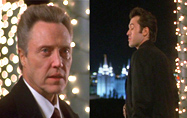
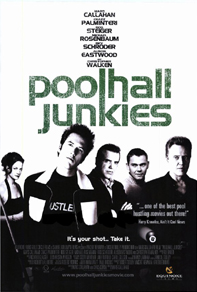


|
One of the lead actors in the film is Latter-day Saint film and television star Rick Schroder. In his first major role on the big screen since 1994 ("There Goes My Baby"), Schroder plays "Brad," one of the top-ranked pool players in the world. A number of Latter-day Saints also worked on the film as crew members and in small parts on screen.
Most of the scenes in this film feature men standing around a pool table, some of them playing pool. Writer/director/star Mars Callahan is himself an expert pool player, and conceived of this film with fellow pool hustler and co-writer Chris Corso as a way to highlight the game they are passionate about.
The plot synopsis below covers the central plot, but omits some scenes, including various additional scenes of pool playing.
The movie opens fifteen years ago, with a teenaged Johnny Doyle shooting pool like a pro, watched over by his long-time manager Joe (Chazz Palminteri). Joe has taken in the orphaned Johnny to and trained him to be a pool hustler, but Johnny anxiously talks about expecting an invitation to join a newly formed professional pool players league. The mail arrives and is retrieved by Joe, who sees the letter of invitation from the new professional league. Joe quietly drops the letter in the garbage, and never tells Johnny about it.
Flash forward fifteen years later, to the present time. Johnny Doyle (Mars Callahan) is older now, and has spent the intervening years as a small-time pool hustler. He and Joe now live in Salt Lake City, Utah where (in this movie, if not in actual fact) there is an active pool playing scene in which a talented pool hustler such as Johnny can eke out a living playing against gullible, less-talented amateurs. Johnny has lived with disappointment about never having had the opportunity to play as a professional. Johnny happens to meet one of the founders of the league, who sees him playing in a pool hall. When they strike up a conversation, the gentleman asks why Johnny never joined their league. Johnny tells him he was never invited, only to be told that, yes, he had been sent a couple of letters inviting him to join. Johnny is enraged when he realizes that Joe had hidden the invitations from him. Johnny confronts Joe, who defends his actions, saying that Johnny could not have cut it in the professional league. Johnny doesn't accept this dishonest explanation. He intentionally loses a match for a bet he knows Joe can't cover. The angry black pool player "Chico" (Glenn Plummer) that Johnny loses to, along with his many black friends, are on good terms with Johnny. They beat up Joe for being unable to pay his losing bet.
Johnny thus leaves Joe permanently, and intends to leave the game of pool behind. He goes to the apartment where he lives with his law student girlfriend Tara (played by Alison Eastwood). Tara disapproves of Johnny's life as a pool player, and wants him to have a regular job. During the rest of the film Johnny struggles between trying to find another type of work, and being pulled back into the world of pool.
Johnny takes a job as a carpenter on a large construction site, a job he obtains only because he has a friend in the business. The foreman tells him he has never seen a worse carpenter, and offers to promote him to a desk job where he would be required to look the other way and not report some unethical, illegal business practices. The foreman assumes that his past career as a pool hustler mean that he has the temperament to accept such dishonest practices. Johnny tells him he has the wrong guy, and walks away from the job.
Trying to get back into the good graces of the woman he loves, Johnny manages to show up at her important work party. While there, he meets Tara's wealthy uncle Mike ("Christopher Walken"), who is an avid pool player. Mike takes Johnny to an upstairs room, where Tara's wealthy attorney boss Phillip Stein (Peter Mark Richman) is playing pool. Mike backs Johnny in a wager on a game with Tara's boss. Johnny wins the game, winning Tara a guaranteed job for one year with the prestigious law firm after she passes the bar in a few weeks. Before Johnny can fully tell Tara what he has done, however, she learns only that he has hustled her boss, which angers her so much that she kicks him out of the apartment. Johnny is forced to stay at his favorite pool hall, run by his friend Nick. Nick is a wise, kind, elderly man played by legendary actor Rod Steiger. [Steiger won the Best Actor Academy Award for "In the Heat of the Night" (1967). Steiger also received Oscar nominations for his roles in "The Pawnbroker" (1964) and "On the Waterfront" (1954). "Poolhall Junkies" was Steiger's last role.]
A major subplot involves Johnny Doyle's younger brother Danny (actor Michael Rosenbaum, famous for his role as Lex Luthor on the popular TV series "Smallville," about Superman's teen years). Danny and his friends Tang (Ernie Reyes Jr.), Chris (Anson Mount) and Brett (Orien Richman) fancy themselves as potential pool hustlers like Johnny, although they don't have nearly enough talent to make it in the business. Many of the scenes between these friends are played for comic relief.
Johnny's old manager Joe, meanwhile, is intent on enacting vengeance on Johnny. Eventually Joe breaks the fingers in Johnny's hand, seemingly forcing him out of the game permanently. Johnny tries to pick up the pieces of his life by getting a job as a salesman at a recreational vehicle (RV) dealership.
Danny's friend Chris tries to hustle Joe and the new pool player in town, Brad (Rick Schroder), who is now working for Joe. Chris loses, and ends up owing Brad and Joe $2,000. Danny and his friends think they have a sure-fire way to pay off the debt by playing against Brad on a slightly off-kilter pool table that Danny regularly practices on at his favorite poolhall. Brad loses many times to Danny on the table, but when Danny goes in to score big money, it turns out that Brad was hustling him by losing on purpose. Brad easily beats Danny, leaving Danny owing Joe and him $5,000 -- more money than he has with him. Joe and Brad beat Danny up and threaten his life if he doesn't come up with the money within 24 hours.
Desperate, Danny attempts to rob a pawn shop, but he is arrested by police. Danny's friends seek out Johnny at his Tara's apartment. Johnny and Tara have by this point reconciled. Johnny's arm and hand are still in a cast, healing after being broken by Joe. But Johnny needs over $25,000 to pay off his brother's debt to Joe and to bail his brother out of jail. He decides to rescue his brother by raising money the only way he knows how: by playing pool.
Johnny challenges Brad to a match. Before they meet to play Johnny removes his cast and spends time practicing pool shots, getting his pool muscles back into shape. He borrows money from Nick so he can cover the bet. Unfortunately, his injuries and lack of practice leave him incapable of beating Brad. He loses, but is able to wager again when Danny's friends Chris brings him another $10,000. Johnny is unaware that the money is their friend Tang's college money. He thinks it is from the ATM card of Chris's wealthy father. He loses all of Tang's college money playing pool against Brad, and it looks like he may have lost every bit of money that he and his friends can get their hands on. But then Tara walks into the poolhall with her Uncle Mike, who is carrying a briefcase full of money. Mike backs Johnny in playing more games against Brad, showing that he has brought a suitcase with $50,000 in it. Johnny uses his reinvigorated pool skills to win a match of "race to 5", meaning that he is the first to win 5 sets. After this, Joe says that he is sick of the back-and-forth garbage going on, and he says he wants to bet it all: $80,000 on a game of "race to 9."
Before playing, Johnny takes a break in the bathroom. While washing his hands, Mike (Chrisopher Walken) enters the bathroom, and tells Johnny a funky Walken-esque story about watching the nature channel and learning from lions on the savannah. Mike's story is an inspirational pep talk, which gives Johnny the confidence to go back out there and play against Brad. Johnny uses his immense skill, as well as a very clever hustle, to win the game.
Upon losing the bet (and all of his money), Joe threatens Johnny and his friends with a handgun. But Brad no longer supports Joe, and Joe is prevented from doing anything against Johnny by the timely arrival of Chico and many tough black friends, all intent on doing serious bodily harm to Joe. Chico is happy for the opportunity to run into Joe again and get some payback, because earlier in the film Joe robbed Chico at knifepoint.
Thus, Danny no longer owes Joe any money. Johnny has paid back Tang's college fund and he has enough money to bail Danny out of jail. The final scene indicates that Johnny fulfills his dream of joining the professional pool circuit, with the support of his girlfriend Tara and his new friend Mike.
One peculiar aspect of "Poolhall Junkies" is the fact that it is set in Salt Lake City, Utah, yet the nature and content of the film seems to be completely uninformed by this fact. One key scene is framed with the Salt Lake Temple centered in the background. Aside from this, the film could have taken place in any moderately large city.
The scene with the Salt Lake Temple, in which Johnny Doyle (Mars Callahan) meets Mike (Christopher Walken) begins at timecode 33 minutes, 37 seconds and ends 35 minutes, 41 seconds after the start of the film, lasting just over two minutes long. The camera cuts between showing the two of them (in front of the Temple), and focusing alternatively only on Walken or only on Callahan.
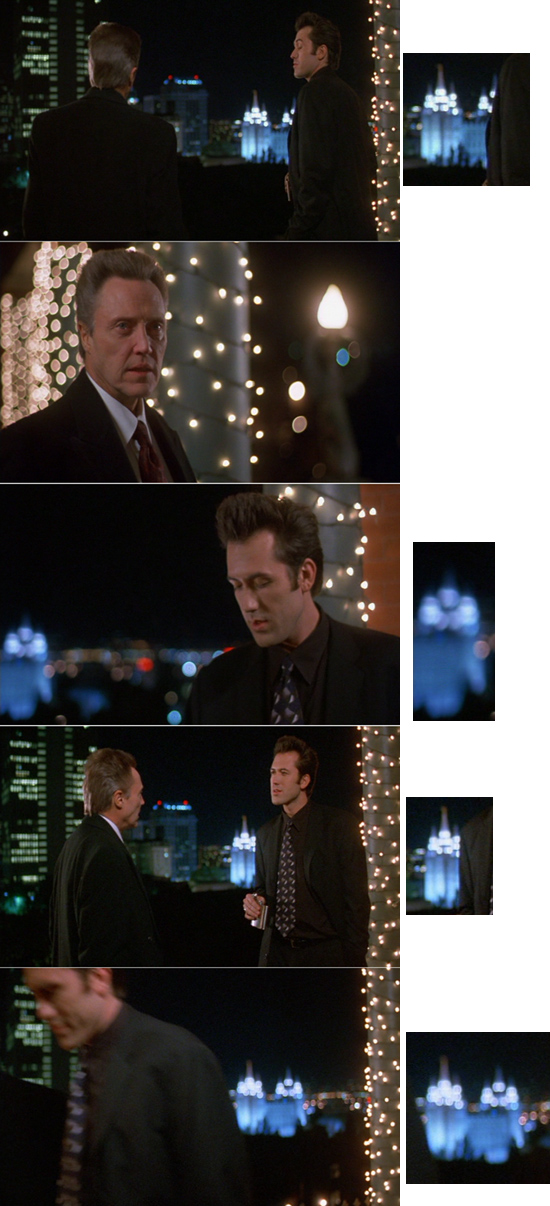
Filmmaker Mars Callahan is not from Utah. He was born and raised in Los Angeles, California. The dialogue in the movie contains no references to Latter-day Saints and only a few subtle spoken references to Salt Lake City and Utah. It is a longstanding tradition in feature films that essentially every character from Salt Lake City is a Latter-day Saint. Yet there does not appear to be a single character in "Poolhall Junkies" who is identifiably a Latter-day Saint. In fact, the language and behavior of all the major characters seem to specifically exclude them from being thought of as practicing Church members.
It seems likely that Mars Callahan wrote his script as a story that takes place in no specific place, a "generic" American city, and that the movie was filmed in Salt Lake City for economic or logistical reasons. Salt Lake City has tall buildings, city locations and interiors necessary to make the film, plus highly experienced film crews and acting talent. Yet it is far less expensive to film in Salt Lake than in Los Angeles, Chicago or New York City.
Given the fact that there Salt Lake City is not mentioned by name in the dialogue, and there are only a few spoken references to the location, some might be tempted to classify "Poolhall Junkies" as a movie that was simply filmed in Salt Lake, but not set there. Most films and television series filmed in Salt Lake are not actually stories that take place there. Salt Lake is used as stand-in for other cities, or is simply meant as a generic, unspecified location.
Yet, there are a number of indicators that the story in "Poolhall Junkies" actually does take place in Salt Lake City, however implausible this may seem give the nature of the story and its characters. After the closing credits, the credit scroll concludes with the statement, "Filmed on location in Salt Lake City, Utah."
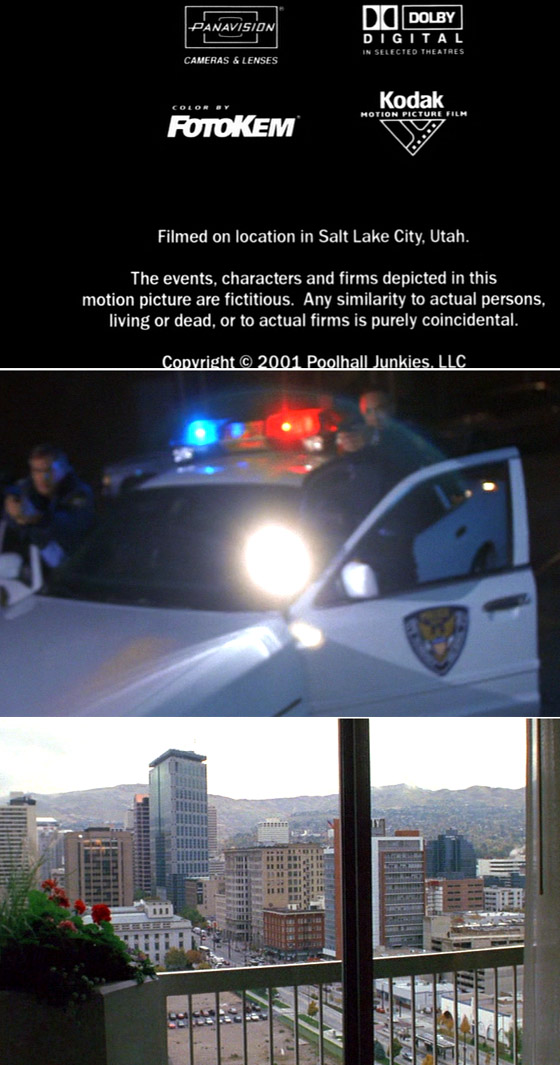
In one scene (excerpted below), Johnny's brother Danny (played by Michael Rosenbaum) sings and plays the guitar with a band at a nightclub. The scene was filmed at the actual Dead Goat Saloon in Salt Lake City, and is referred to by name in the film. Characters also refer to going to "the State Line" to play pool in a legal gambling establishment, a reference to the Nevada/Utah border.
Furthermore, as mentioned previously, the Salt Lake Temple of the Church of Jesus Christ of Latter-day Saints is clearly and prominently seen in the middle of the background in a key scene. This is not just an accidental "glimpse" of the Temple while a cityscape is being shown. The Temple is intentionally included in the shot.
The Salt Lake Temple is shown in the scene in which the film's protagonist "Johnny Doyle" (played by the writer/director himself, Mars Callahan) meets the character who becomes his friend, ally and financial backer, "Mike" (played by the film's most currently prominent actor, Academy Award-winner Christopher Walken). Mike is a millionaire and the uncle of Johnny Doyle's girlfriend "Tara" (played by Alison Eastwood, the daughter of Clint Eastwood). Johnny has come to a Salt Lake City mansion for a work-related party at the behest of Tara, a law student who works as a clerk at a prestigious law firm. Not long after Johnny arrives (late) he gets into a slight argument with Tara over the way he talks to some of her co-workers. Johnny walks away from Tara and is standing on a balcony overlooking downtown Salt Lake City when he is approached by Tara's uncle Mike (Christopher Walken). As they introduce themselves to each other Johnny asks if Mike plays pool. He explains that he noticed the crease in Mike's pants, a horizontal crease lightly tinged by chalk, the sign of an avid pool player. Mike then invites Johnny upstairs to play pool. This begins a friendship between Mike and Johnny which will eventually lead to a resolution of the climactic conflict in the film, as well as set Johnny on the path to achieving his goal of becoming a professional pool player. It is during this conversation that the Salt Lake Temple can be seen in the background.
Simply having any building in the background of a shot is not enough to establish where a movie takes place. But the Salt Lake Temple is a distinctive, internationally known landmark universally associated with Salt Lake City. The Temple concretely identifies the setting of this film as Salt Lake City, even if almost nothing else does. New York Post reviewer Lou Lumenick was one of a number of reviewers who pointed out the film's Salt Lake City setting, observing that the "story is set in Salt Lake City."
A number of movie reviewers even noted how the Utah setting was oddly immaterial within the context of the film. Village Voice reviewer David Ng wrote: "Set in and around Salt Lake City, Poolhall Junkies never gets around to acknowledging the irony-rich potential of its puritanical locale." Reviewer Eric D. Snider, a Latter-day Saint based in Utah County, pointed out: "It was shot entirely in Salt Lake City -- you'll catch a glimpse of the LDS temple in one scene -- but it could have been anywhere." Walter Chaw (Film Freak Central) wrote ironically: "In Salt Lake City, that seething hotbed of urban nightlife, Johnny haunts the local pool halls." Jason Janis (DVDTalk.com) wrote: "Set in the world of petty hustlers and neon-lit halls, and shot in Salt Lake City (who knew?), Poolhall's boilerplate setup is instantly recognizable."
Sean P. Means (Salt Lake Tribune) wrote: "To his credit, Callahan captures the pool-shark life... He finds some seedy locations in supposedly squeaky-clean Salt Lake City." But in their general assessment of the film, Utah critics, like those outside the state, were harsh in their assessment of "Poolhall Junkies." Deseret News reviewer Jeff Vice said: "Because the film was almost completely shot in Salt Lake City and surrounding areas, it's an embarrassment for Utah as well."
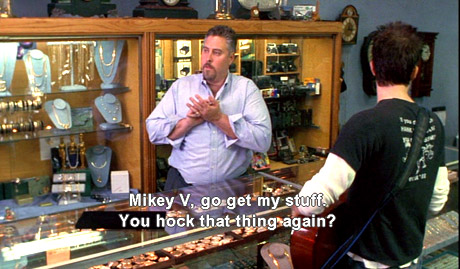
[SCENE: Inside a pawn shop, day time. Johnny Doyle enters the shop. Johnny tosses something to a portly, bearded man wearing a light blue long-sleeve, collar shirt, standing behind the counter.]
Johnny Doyle (Mars Callahan): Hey, Mikey V, go get my stuff.
[Johnny approaches the counter. His brother Danny Doyle is already in front of the counter, holding a guitar.]
Johnny Doyle: [To Danny] What, you hock that thing again?
Danny Doyle (Michael Rosenbaum): I just needed a little cash for last night's game, that's all. [To the man behind the counter.] Hey, V! You pawn motorcycles?
Mikey V: I pawn anything, you know that.
Johnny Doyle: [Tapping Danny on the shoulder, turning his brother around to face him.] Hey, that's your guitar. You're not supposed to pawn that.
Danny Doyle: Yeah, and he's got your pool cue back there. You're not supposed to pawn that.
Johnny Doyle: That's different.
Danny Doyle: Why is that different?
Johnny Doyle: Because it is. Now, listen, if you need something, I want you to come to me. I don't want you hocking that thing again.
Danny Doyle: Yeah, well that's not very practical, Johnny. You're never around.
Johnny Doyle: Well, I'll be around.
Danny Doyle: Yeah? I'm playing at The Goat, Friday. Think you can come around then?
Johnny Doyle: Now, why you gotta say it like such a f---ing asshole? Just ask me nicely, and I'll be there. What time?
Danny Doyle: Eight o'clock.
Johnny Doyle: Well, I'll be there at eight. All right?
Danny Doyle: We'll see.
[Danny plays a riff on his guitar.]
Johnny Doyle: Looks like you're getting pretty good at that thing, huh?
Danny Doyle: Yeah, I'm getting pretty good at a lot of things.
[Mikey V can be seen in the background of the shot, walking back to the counter from a back room. He is carrying Johnny's pool cue.]
Danny Doyle: Better watch yourself. I'll be coming after you soon.
Johnny Doyle: I'll be sure to keep my eyes open. [Pulls a roll of bills (money) from his pocket. Starts counting out some bills to give to Danny.] Look, I made a score last night, so just take some--
Danny Doyle: What are you doing?
Johnny Doyle: Take this. Take it.
Danny Doyle: Are you gonna embarrass me in front of V?
[Both brothers look in Mikey V's direction.]
Danny Doyle: Come on, you're my brother, not my mother. And you start looking out for yourself. You're in here, too.
Johnny Doyle: That's me. That's not supposed to be you, all right? [Look's in Mikey V's direction, but speaks so both Mikey V and his brother Danny can hear.] I mean, I leave town for five minutes, V, and this guy thinks he's some kind of hotshot pool shark or something.
Danny Doyle: Yeah, well, I am.
Johnny Doyle: No, you're not.
Danny Doyle: Yeah, I am.
[Danny takes the guitar strap off his shoulder, puts the guitar down on the counter. Puts his arms out and steps forwards toward Danny, getting in his face. They are joking around, smiling.]
Johnny Doyle: You know, you should not be having your hands like that.
Danny Doyle: Why should I not have my hands up?
Johnny Doyle: Because someone could just, I don't know... [Slaps Danny's face lightly.] Oh! Oh, my goodness! Is that horrible?
[Johnny uses a street-fighting move to grab Danny and put him on his back on the ground, pinning him.]
Johnny Doyle: You know something. You really want to see some pool playing you should come down to the State Line with me. Check out the pros.
[The next scene shows a large hall on the State Line, where professional pool players are shooting pool, and spectators are watching. Johnny Doyle leads his brother Danny through the room, and the find a seat on bleachers among the specators. A sign that says "Nevada" can be seen in the background.]
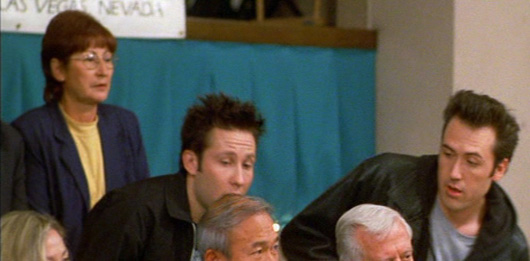
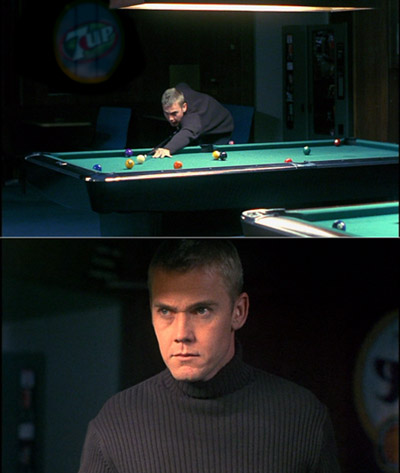
In "Poolhall Junkies" Schroder has the 5th-billed role as "Brad," a phenomenal pool player (ranked #13 on the professional circuit) who joins with Johnny Doyle's old manager Joe (Chazz Palminteri) to hustle Johnny's friends, and attempts to hustle Johnny himself. (Schroder is listed 5th on the official movie poster, but he is listed 2nd during the opening credits and during the closing credits.) Schroder's character is a man of few words, but great skill at pool. He and Johnny Doyle seem evenly matched. Brad seems for a time to be the protagonist's nemesis, but in the Johnny and Brad part on friendly terms. Johnny's real nemesis was his ruthless and dishonest former manager.
A number of other Latter-day Saints had bit parts in "Poolhall Junkies." Shannon Engemann ("Message in a Cell Phone", "Wildest Dreams", "Brigham City"), Nathan Stevens ("Punch-Drunk Love"), Michelle Ainge ("The Singles Ward", "Out of Step", "The Abby Singer") and Jerry North ("Brigham City") all had credited bit parts. Michelle Ainge's part is listed in the closing credits as "Party Girl." Jerry North is listed as "Red." Nathan Stevens plays the part of "Kid." Prolific Utah character actor Frank Gerrish ("Brigham City", "Baptists at Our Barbecue", "Dumb Luck", etc.) also has an uncredited bit part.
Latter-day Saint filmmaker Spanky Dustin Ward was a production assistant for "Poolhall Junkies." Ward was the first assistant director for the upcoming Latter-day Saint-themed feature film "Day of Defense." Ward's short film "Number 9" received an Audience Choice Award at the 2002 LDS Film Festival. A number of other Utah and/or Latter-day Saint film crew members worked on "Poolhall Junkies," including Steadicam operator Don Muirhead. Michael Worthen (cinematographer of the LDS Cinema feature film "Out of Step") is credited as "additional first assistant camera" for "Poolhall Junkies." Casting was assisted by Jeff Johnson, the Utah-based actor and casting director whose casting credits include Little Secrets (2002); Double Teamed (2002); Hounded (2001); Just a Dream (2001); The Poof Point (2001) and many more. Johnson played "Garcia", Tayva Patch's FBI agent-in-training partner in "Brigham City."
Latter-day Saint actor Rick Schroder, who has relatively few lines, but a strong presense, was mentioned in nearly every review, but only to identify his character: pool shark "Brad," the new protégé of Johnny Doyle's old trainer/manager "Joe." When reviewers took the time to say something about Schroder's performance, they were always positive.
Carol Cling of the Las Vegas Review-Journal praised "an effectively intense Rick Schroder."
Mike Murphy (Movie-Vault.com) wrote: "Big surprise to look out for as well is Rick Schroder, who does a great job as Palminteri's ace. Schroder is actually a solid player in life."
Harry Knowles of Ain't It Cool News was ecstatically enthusiastic about "Poolhall Junkies," and included Schroder in his praise, noting that the film "also had that Lex Luthor guy from SMALLVILLE (Michael Rosenbaum) along with little Ricky Stratton all grown up... um, I mean Rick Schroder... the movie features Rick Schroder in a damn fine role."
Craig Hamann (CULTcuts.net) wrote: "Ricky Schroder is first rate as Brad. It's nice to see Schroder reveal some of his sizable talent again after being badly miscast in a wimpy role on the usually reliable NYPD Blue television series a few years ago."
Walter Chaw (Film Freak Central) noted that Joe's new apprentice was played by "a reptilian Rick Schroder" (either praising the actor for his chameleon-like ability to transform himself into a different character, or commenting on the cold, calm persona of the "Brad" character).
Many reviewers thought Schroder was part a cast that was particularly impressive in a low-budget feature directorial debut. Robert K. Elder of Chicago Tribune said: "An impressive cast of Christopher Walken, Rick Schroder and Rod Steiger... pad out some small roles..." David Nusair (Reel Film Reviews) said "Callahan has assembled an amazing cast, featuring folks like Michael Rosenbaum, Rick Schroder, and Christopher Walken." Louis B. Hobson of The Calgary Sun said that "Schroder exudes a steely naivete." Prairie Miller of The Long Island Press said "it was decidedly the wrong move [for director Mars Callahan] to cast himself as the star, since he's continually upstaged by screen heavies like Walken, Palminteri, and Schroder, who looks kind of like a young Steve McQueen."
Brian Balchack (MovieWeb.com) wrote: "Of course everyone is a sucker for Christopher Walken, but when you throw the surprisingly high caliber performances in of Chazz Palminteri and Rick Schroder you can tell that these indie filmmakers got their money's worth. The intensity on Schroder's face during his every move during the hustle, the passionate taking on of the tough guy role by Palminteri, and the utter style that is Christopher Walken made for a truly brilliant character based storyline."
Erick Harper (DVD Verdict) wrote: "For only his second outing as a director, Callahan assembled one of the finest big-name casts ever to appear in an independent film, including Chazz Palminteri, Rod Steiger, Rick Schroder, Alison Eastwood, and the inimitable Christopher Walken. This is true acting power, and the characters they create are a main source of the film's life and energy."
Emily Blunt (Blunt Review) wrote: "Mars Callahan had the great fortune of gathering Walken, Palminteri, Rick Schroder and dearly departed Rod Steiger for this electric film. The characters talk realistically without sounding like they're trying to be clever. That's a whole lot harder than it sounds, and it's thanks to the caliber of Callahan's whole ensemble of actors... that truly makes this film delightful."
Jason Matloff of Premiere Magazine wrote: "Poolhall boasts an impressive cast including Rick Schroeder, Rod Steiger (in his last role), and Christopher Walken..." Jon Alon Walz of Boxoffice Magazine wrote: "...the first yes from Christopher Walken provided that spark that got the likes of Rod Steiger, Chazz Palminteri, Rick Schroeder and Alison Eastwood involved in this low-budget movie..." Brian Calhoun (digitallyOBSESSED.com) said: "The worthwhile performances come from Chazz Palminteri, Christopher Walken, and Rick Schroder, who seem like they have wandered in from the set of a far better film. Regrettably, they possess far too little screen time to save Junkies." Conrad Corral (Dog Pile / Malamute, Inc.) wrote: "One can only imagine the favors that Callahan called upon to get Walken, Palminteri, and Schroder."
Clint Morris (MovieHole.net) said: "Poolhall Junkies is one of the more engaging Independent movies of late -- and best of all it's got some tour de force performances from the likes of Chazz Palminteri, Christopher Walken and Rick Schroeder [sic]... check out little Ricky Schroeder, as nasty as burnt-leather as the shark of the game, an unconquerable opponent who joins forces with the seedy Joe."
Barry Paris of the Pittsburgh Post-Gazette wrote: "You or I could've made "Poolhall Junkies" just as badly as writer-director Mars Callahan, but we never could've gotten it released, because Mars has one mysterious skill that you and I lack: the ability to get Rod Steiger, Christopher Walken, Rick Schroder, Chazz Palminteri and Alison Eastwood to sign up for supporting roles. How he managed this, we'll never know... Schroder is embarrassed."
Rebecca Murray (About.com) wrote: "Rick Schroder also makes an appearance as a professional pool player who is living the life our hero Johnny pictured for himself. Schroder is believable though he's kind of lost in the background when either Walken or Palminteri (or even Callahan) enter the picture."
Adam Nayman of eye WEEKLY was among those surprised at seeing child TV star once known as "Ricky" in an adult role: "Johnny is forced to go one-on-one with a Terminator-like pro played by, of all people, Ricky Schroder." Nicholas Schager (MovieWeb.com) praised the performance of "a surprisingly convincing Rick Schroder." e! online: "Palminteri seeks revenge through a high-stakes match with new protege Rick Schroder (yes, that Rick Schroder)." Ryan Kugler (CinemaSpeak.com) wrote: "Joe re-enters Doyle's life with a new protege (Rick Schroder, I laughed too) in tow."
Jason Janis (DVDTalk.com) was certainly in the minority, as he seemed to have mixed feelings about Schroder's performance:
...just for good measure, Joe resurfaces with his new protege in the stone-faced Brad, played with relentless seriousness by Rick Schroder. (Perhaps it's Salt Lake City, but in all my days of modest pool shooting I have yet to encounter a hustler who looks like Schroder, complete with a turtleneck sweater. And I have never met one who would willingly tell people that his name was Brad.) Schroder simultaneously appears glad to be working yet somehow not-at-all-happy-about-it, and even if his turtleneck is intended as a tribute to Steve McQueen, he brings a bit less to the table (forgive the pun) than the Bullitt iconoclast.
Hock Guan Teh (DVDTown.com) was one of a few writers who felt Schroder was under-utilized: "Unfortunately, another strong actor, Rod Steiger, who plays pool parlor owner Nick, is left with only a weak role that does not play to his strengths. The same goes with former child star, Rick Schroder, who barely gets any meaningful lines of dialogue." Stacie Hougland (Hollywood.com) wrote: "Schroder has maybe two lines and gives a good butt-whuppin', but he mostly just does a lot of lip mashing to show his frustration, satisfaction, confusion..."
Callahan: We shot this in Salt Lake City, where there were absolutely no black people.
Corso: Did we ship them in from Detroit?
[Laughter]
Callahan: There's no black folks in Salt Lake City, so... I mean, there's like...
Corso: Nine of them. And all nine of them are in our movie.
10 minutes, 8 seconds after start of film:
[Scene: A pool hall. The character "Brad" (Rick Schroder) is shown for the first time.]
Corso: Here comes a shot I like. Yeah. Rick Schroder. Peek at him.
[As Johnny Doyle gets a look at "Brad" (Rick Schroder) for the first time, the camera zooms in rapidly on Schroder, who is playing pool.]
Corso: There it is. That's the shot moment I love.
Callahan: I was really pleased with, uh, Rick Schroder's performance in this movie. You know, as a director I had the idea of making him appear very Steve McQueen-esque. I wanted him to do a throwback, with, like, the old "Bullitt" days. You know, like with the keeping him in the turlenecks and keeping him very intense. You'll see it later in the picture how I kind of went for that.
Corso: Well, there's no doubt about it.
Callahan: I think it paid off.
Corso: Yeah, I think he captured that vision and I think his performance, as well, was very subtle, very much like a Steve McQueen.
Callahan: And if you want to know anything about Rick Schroder, anybody who's listening to this... This guy... workin' all kind of hours. He was up and moving equipment sometimes, in the snow. I mean, the guy was just gung ho and ready to show up and work and just totally professional, totally prepared.
Corso: Never complained once.
Callahan: Oh! Yeah, what a dream to work with, that guy.
Corso: Never complained once.
Callahan: You know, sometimes you hear stories about kids that are, like, child actors, and they lose their mind. But he was a solid guy.
Corso: Well, he was working "NYPD Blue" and he broke, uh, from the, uh, set set. During his breaks he and Robert Le Blanc [spelling?] would go down to the pool hall and work on his stroke, and then his game and they worked on it for about, I guess, about a week and a half, two weeks prior to the film.
Callahan: That's right. Yeah. Get him in shape. Get him ready to make this movie.
Corso: Robert Le Blanc said he was the best to work with. And look at how fast he picked up everything. He had a natural talent.
12 minutes, 39 seconds after start of film:
[Scene is outdoors, on a large construction site.]
Callahan: This was amazing. We had this whole set.
Corso: First day of shooting.
Callahan: First day of shooting.
Corso: Remember? We didn't have a crew. We were lugging stuff around.
Callahan: Chris Corso was lugging the camera gear around. We're out here on this, like this, they were building a hundred million dollar complex in downtown Salt Lake, so we--
Corso: For the Olympics.
Callahan: We got lucky and got-- We were able to, like, take advantage of having all this construction, for free, basically. It was amazing.
12 minutes, 39 seconds after start of film:
[Scene: inside a pawn shop.]
Callahan: Mikey V. One of our friends from Salt Lake. This is actually his pawn shop.
Corso: A little more nepotism... This was the... second day of shooting?
Callahan: Second day of shooting. Rosenbaum flew in and, uh, hit the ground running. He had to jump right in this scene and-- and--
Corso: Two hours later.
Callahan: It was unbelievable.
Corso: And everybody was impressed how the two of you really looked like brothers.
[Skipping some discussion about actor Michael Rosenbaum.]
Callahan: Michael Rosenbaum can actually fart on cue. No, it's not a real fart.. He can, with his hands, or some sort of body part, I don't really know how he does it, but he can make probably about 400 different fart noises. And we were at a restaurant one time in Salt Lake City and [laughs] every time when the waitress would come by he'd make these noises [laughs] and it was something else [laughs]
28 minutes, 58 seconds after start of film:
[Scene: a private pool shooting room at a pool tournament at the State Line, in Nevada just across the Utah border. Dimitrius Deslis [his name is also spelled "Dimitrios Deslis"] appears on the screen. He is wearing a gaudy black and with yellow print shirt, a gold chain necklace, and green-tinted sunglasses. In the film Dimitrius Deslis's character is identified as "Greek." In real life, he is director Mars Callahan's business partner. People interested in opening up a "Poolhall Junkies" poolhall franchise contact Dimitrius Deslis for an information packet or to make further arrangements.]
Callahan: [Laughs]
Corso: Another friend.
Callahan: This is Dimitrius Deslis on the right. And this is Liza Powell on the left. Now, Dimitrius is...
Corso: What you see is what you get.
Callahan: Exactly. [laughter] He's the-- He's the most famous non-famous guy in Salt Lake City.
Corso: Look at the way he fills up the screen. Look at that! He's a natural.
Callahan: He's awesome. One of my dearest friends.
Corso: Great guy.
Callahan: When we shot in Salt Lake City he was able to, uh, come in and do a little part in the movie. Play "Greek," you know--
Corso: That's another great moment.
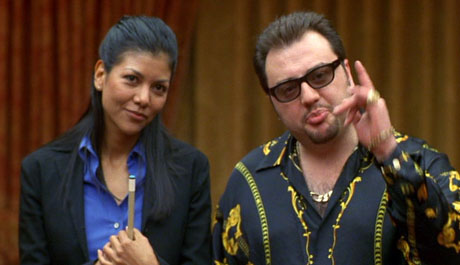
Shannon Engemann has two scenes in "Poolhall Junkies," but it is not a major role. In the closing credits, which are listed by relative prominence, she is the 16h actor listed. Shannon Engemann's biggest film role was in "Message in a Cell Phone," directed by Eric Hendershot. Before "Poolhall Junkies," her only role in a theatrically released feature film was in the LDS Cinema film "Brigham City." Shannon Engemann is also well known to Latter-day Saint audiences as one of the stars the national touring production of of "Saturday's Warrior." She is one of the singers on the Original "Saturday's Warrior" Soundtrack CD (which is different from the soundtrack CD made from the 1989 video production). Shannon Engemann's brother-in-law is CNN talk show host Larry King.]
Callahan: Shannon Engemann. Stephen Book. And then on the right is Brian Schwartz, who doesn't say anything. But he's very key in this movie. [Laughs]
Corso: Presense is strong. Presense is strong. [Listens to Shannon Engemann deliver a line, and then talks about her] And, what a pro she is, too! I mean, you come in, you do one scene and you nail it like this. Or one or two scenes.
Callahan: She was great.
Corso: Wonderful. I was so impressed with ALL the actors. Nobody was dropping lines. It was just, uh... I think, you know the veterans came in, established the level, the standards, and everybody, uh, rose to it.
[Shannon Engemann, as Tara's friend "Beth" has another scene that takes place 49 minutes after the start of the film. In that scene she is at Tara's home when Johnny Doyle tries to call Tara. Tara does is mad at Johnny for playing pool all the time, and she doesn't want to talk to Johnny. She has not been returning his calls. Johnny talks to Beth (Shannon Engemann) but won't let him talk to Tara. Johnny tells Beth that he has an important message for Tara, and asks her to write it down. After waiting for her to get a pen and paper, he asks if she is ready. She says she is, and he hangs up the phone on her.]
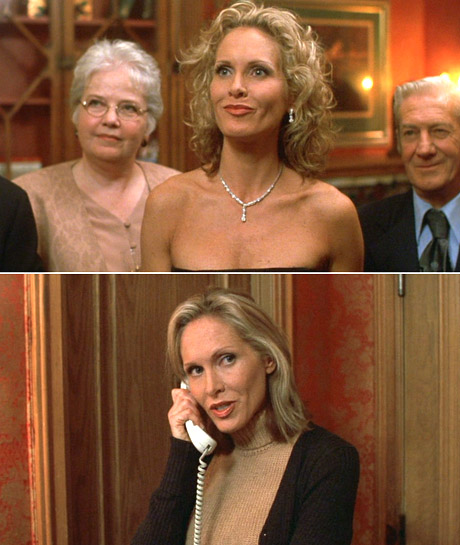
Corso: We were at, we should mention Eo's, uh, Poolhall. [Referring the the poolhall in Kearns, Utah where many scenes were filmed.]
Callahan: Poolhall. Salt Lake.
Corso: Big, beautifully authentic
Callahan: Thanks to Darrin and his family.
Corso: Mama.
Callahan: Rolled out the red carpet for us. Opened up their poolhall to us.
47 minutes, 37 seconds after start of film:
[Scene: An RV (recreational vehicle) dealership. The mountains surrounding Salt Lake City can clearly be seen in the background. Johnny Doyle is trying to get a job at the dealership, and is talking to the owner, "Merv," played by actor Gino Dentie.]
Callahan: This is funny because the weather was so crazy in Salt Lake at the time. We had sun one day, and snow the next day, and the continuity-- If you look at this movie, the continuity is absolutely ridiculous. Because there's snow, and sun and--
Corso: But for all you young filmmakers out there, all you do is do what we do. We wrote in there, "Oh, this weather's crazy isn't it?"
Callahan: Exactly. We commented on it. That's right.
Corso: We gave Michael a line or two like that.
54 minutes, 17 seconds after start of film:
[Scene: A pool hall. Danny Doyle's friends are hustling, playing pool games for money. Brad ("Rick Schroder") offers to play against them.]
Corso: Ooohhh..
Callahan: This is... my second favorite... best lit scene in the movie. Look at him [Rick Schroder] come out of the darkness... into the light. Ah!
Corso: Is Rick Schroder the coolest, or what?
Callahan: Yeah, he was really good in this picture.
Corso: You got him lookin' like a rock star, here.
Callahan: The thing I think is great about this character is he's all business.
Corso: Yeah. Yeah, yeah... There's a lot of actors would think, "Well, you know, there's not a lot of lines here." But...
Callahan: He does so much with the stuff that he doesn't say.
Corso: Exactly.
Callahan: Yeah... And he looks great shootin' pool, too, which was key. I hate it when you see movies with actors that are shootin' pool and they just look ridiculous. But he did a great job.
58 minutes, 11 seconds after start of film:
[Scene: The Dead Goat Saloon. Danny Doyle (Michael Rosenbaum) is playing the guitar and singing with a small rock band. The bar he is playing in is almost entirely empty. One of his friends, Brett (Orien Richman) is there, enthusiastically snapping his fingers and shaking his head to the music, along with one or two other people.]
Callahan: Now this is actually the house band at a place called the Dead Goat, which is a place we shot in Salt Lake City. And, uh, this is actually the real band that plays there. And the owner is actually the bass player. The owner of the Dead Goat is the bass player.
1 hour, 29 minutes, 24 seconds after start of film:
[Scene: The pool hall, after Johnny (Mars Callahan) has defeated Brad (Rick Schroder) in their final game, and everybody has left Joe to be "taken care of" by Chico and his cohorts. Johnny is walking out of the poolhall and Brad walks up from behind to join him. Brad tells Johnny that he should come play on the professional circuit. Johnny says Brad wouldn't like that, because it would mean he (Johnny) would be beating him all the time. Brad responds that Johnny didn't beat him, he hustled him.]
Callahan: This was actually Rick's idea. Rick wanted a tag scene for us to do together. And, so, we wrote it in five minutes before we shot it. It was just great. And it was a nice moment to wrap it up. You know, even though he [Rick's character "Brad"] was kind of a badass and he did a few shady things... You know, there's still sort of a mutual respect between two guys.